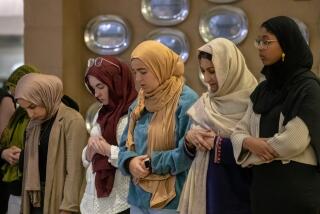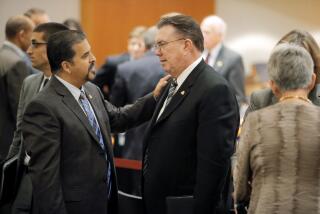Mosques adapt to coronavirus shutdown by sharing the call to prayer. In Culver City, neighbors said it was too loud
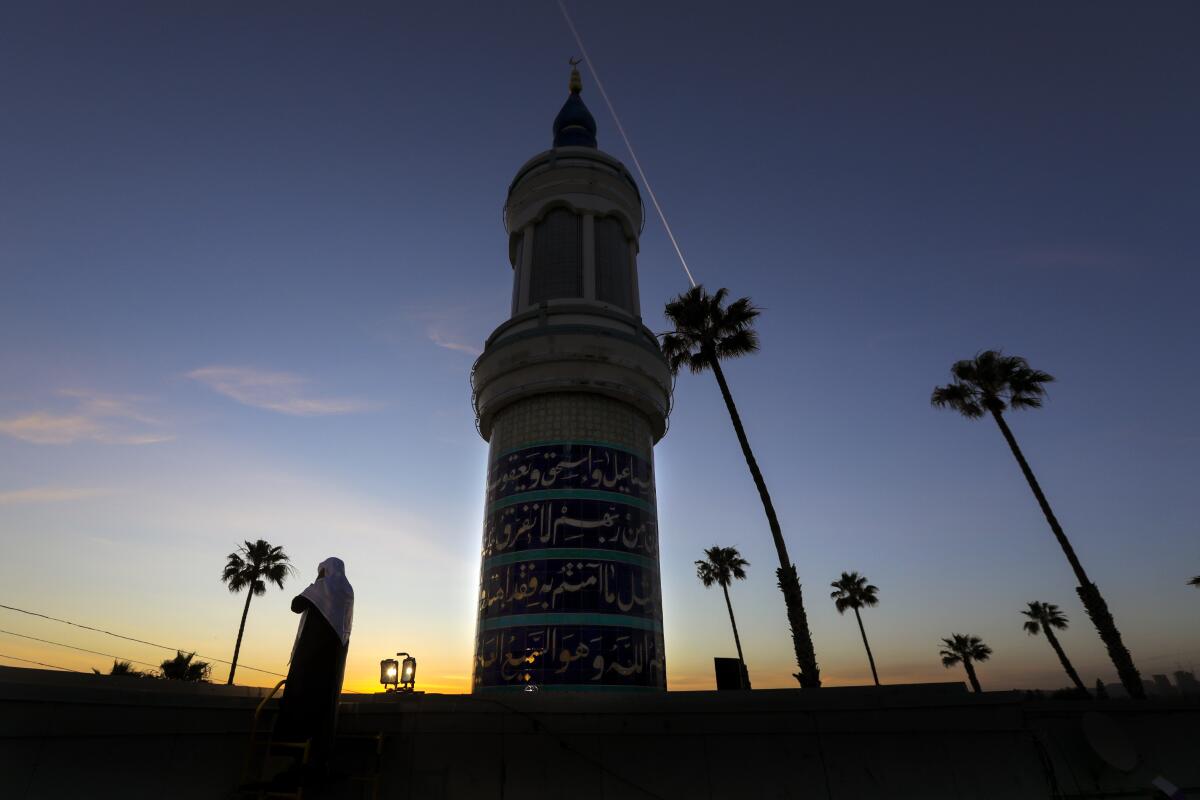
- Share via
The call to prayer rang out at 7:49 on a Saturday evening as the sky glowed pink from the setting sun.
Women in hijabs and masks gazed up at the mosque as the Arabic hymn floated down:
Allah is the greatest.
I bear witness that there is none worthy of worship except Allah.
Mahmood Nadvi stood on King Fahad Mosque’s roof, 60 feet above the street, nearly level with the palm trees, singing into a handheld microphone.
For over 1,000 years, Muslims have relied on the human voice to call the faithful to prayer. It’s become tradition that wherever a mosque is built, there is a place for the muezzin, or prayer caller, said Aslam Abdullah, a Muslim scholar based in San Bernardino.
While the adhan echoes five times a day in Islamic countries, like a Roman Catholic church bell signaling Mass, it is unusual to hear the adhan publicly broadcast in the U.S., where it is more likely to be heard in Hollywood movies.
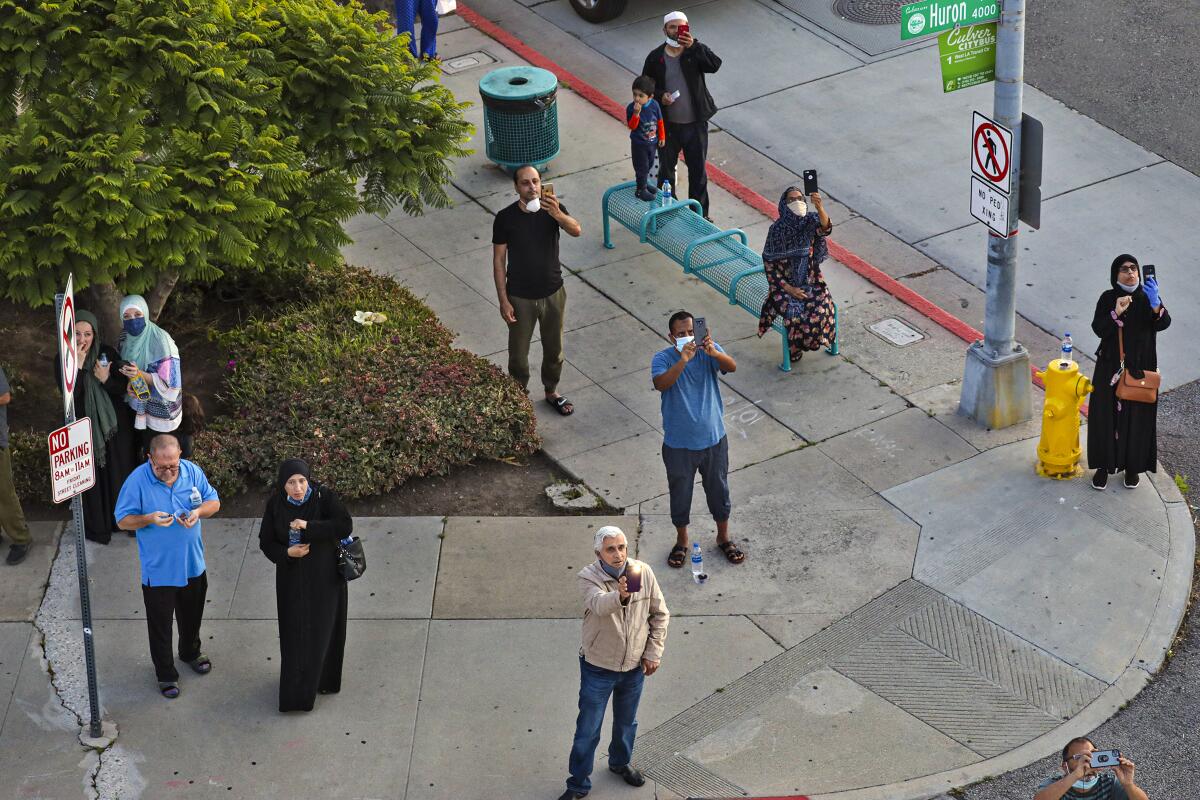
Which is what made the scene in a Culver City neighborhood, near a gun shop and a church with a sign reading “Jesus Saves,” unusual. Even historic. Like the life-altering pandemic that inspired it from here to Minnesota to New Jersey during Ramadan, the holiest month in the Islamic calendar.
In extraordinary times, when Muslims are unable to break the fast and pray together because COVID-19 has forced mosques to close — as it has some churches and other places of worship — the adhan has brought comfort. Cities across Southern California, including Redlands, Fontana, Rancho Cucamonga and Claremont, have allowed mosques to broadcast the call to prayer publicly.
Outside the Culver City mosque, some pedestrians stopped in their tracks when they first heard the adhan, seemingly surprised. This was something new, and it was not altogether clear how it would be received — as with many things Muslim in the U.S.
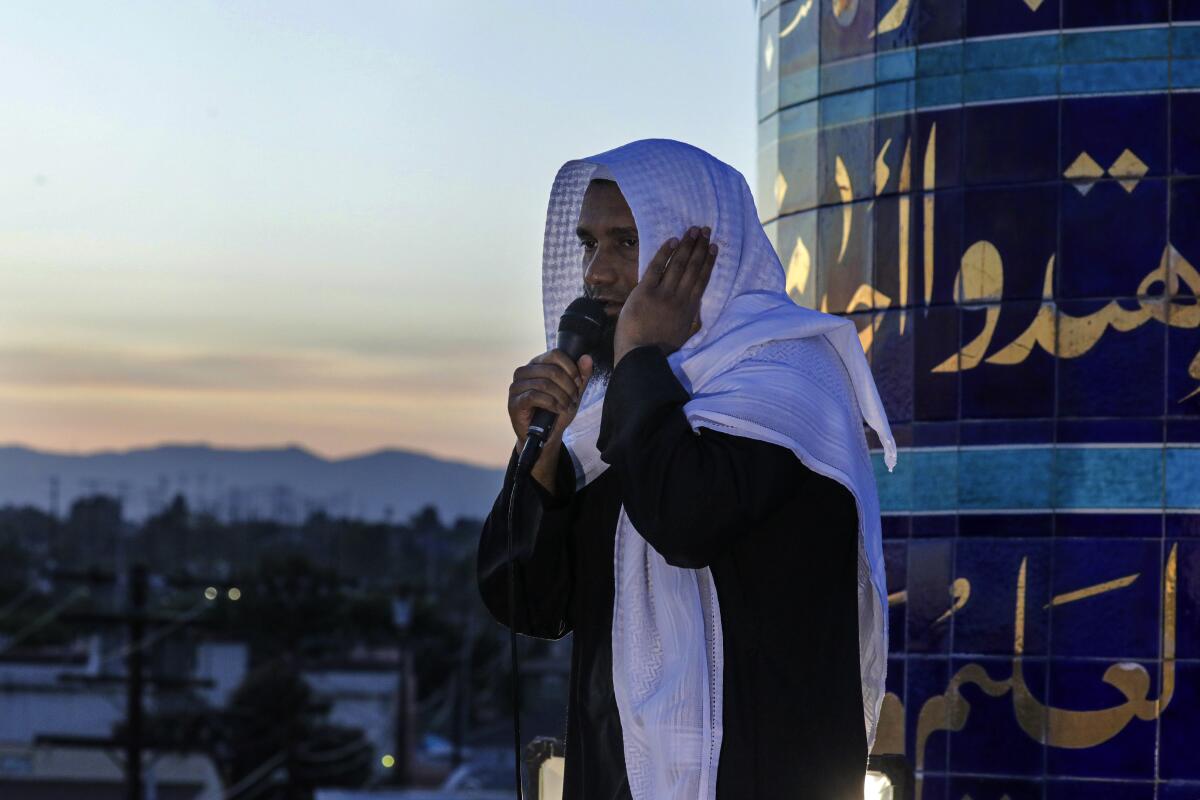
“It is indeed historical,” said Abdullah, who in the last week has heard the call to prayer broadcast in Redlands and Fontana. “It’s more than tolerance, it is our acceptance, I think. That’s a remarkable thing that this country has shown once again.”
But in Culver City, the call to prayer did not go unchallenged for long.
After four days, on May 18, the city’s police department revoked the amplified noise permit, citing people congregating at the mosque in violation of the county health order, as well as “numerous loud noise complaints from area residents.”
“We have had and will continue to have a great relationship with mosque leadership,” said Capt. Jason Sims with the Culver City Police Department. “We are certainly happy to help with facilitating any type of service that is not in violation of county health orders.”
Three days later, the city changed course again, reinstating the permit on the condition that the mosque lower the volume.
Meanwhile, on the Nextdoor social networking app, debates raged between neighbors.
“I’m glad I don’t live near there,” someone commented, spawning a string of responses.
“There are a lot of bitter racists in CC,” someone replied.
“What has a Muslim ever done to you?” one user said.
“Make me unhappy,” another responded.
Another commenter added: “You should ask people from Europe what they think about the muslims? I don’t think you get many people cheering them on.”
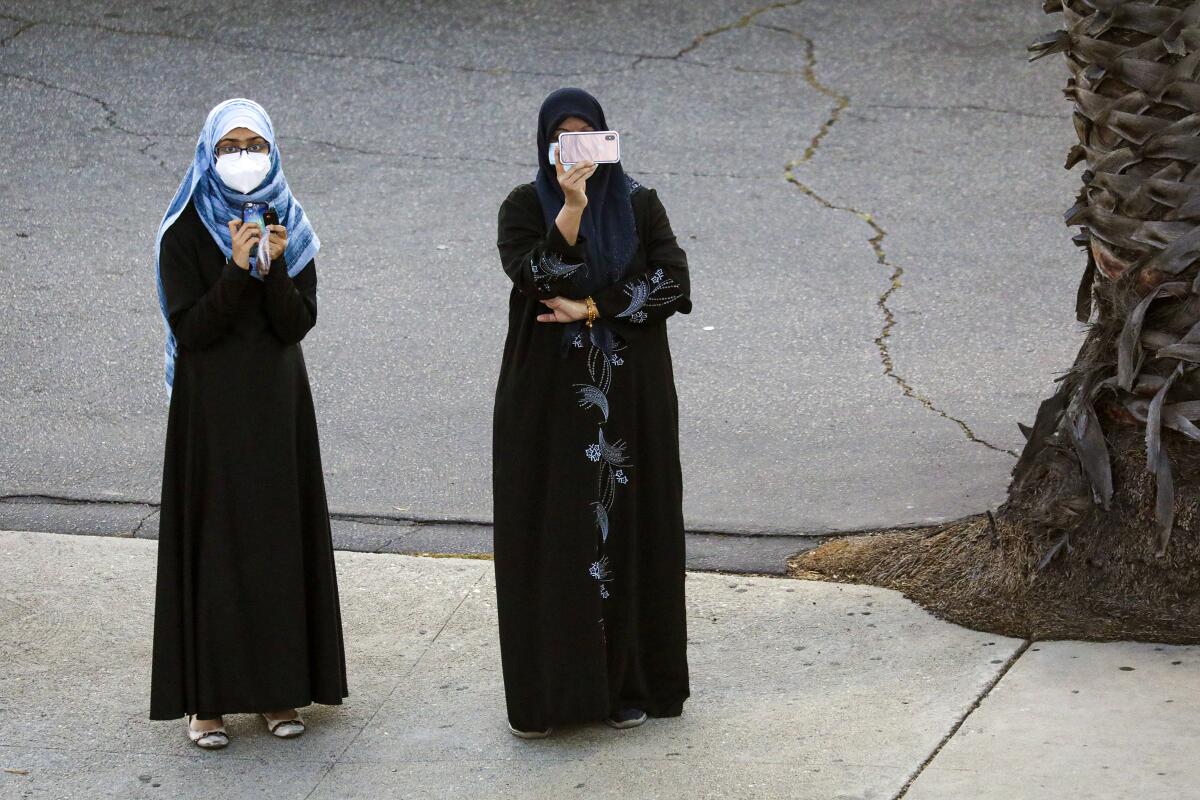
Across the U.S., the closure of churches has prompted pushback, with some filing lawsuits and a few defying stay-at-home orders.
The U.S. Justice Department warned in a letter Tuesday that the measures Gov. Gavin Newsom enacted to slow the spread of the coronavirus and his plans to unwind them might discriminate against religious groups and violate their constitutional rights.
More than 1,200 pastors have vowed to hold in-person services on May 31, Pentecost Sunday. On Friday, Trump declared houses of worship “essential” and called on governors to allow their reopening.
In the U.S., the question of whether to broadcast the adhan publicly has been controversial over the years. When the City Council in Hamtramck, Mich., approved the local mosque’s request to amplify the call to prayer in 2004, it sparked anger in the town.
“With so much going on in the world with terrorism, people are afraid maybe they’ll be saying things [in Arabic] that we don’t understand,” a bakery manager said at the time.
Despite the initial controversy, the adhan continues being broadcast there today.
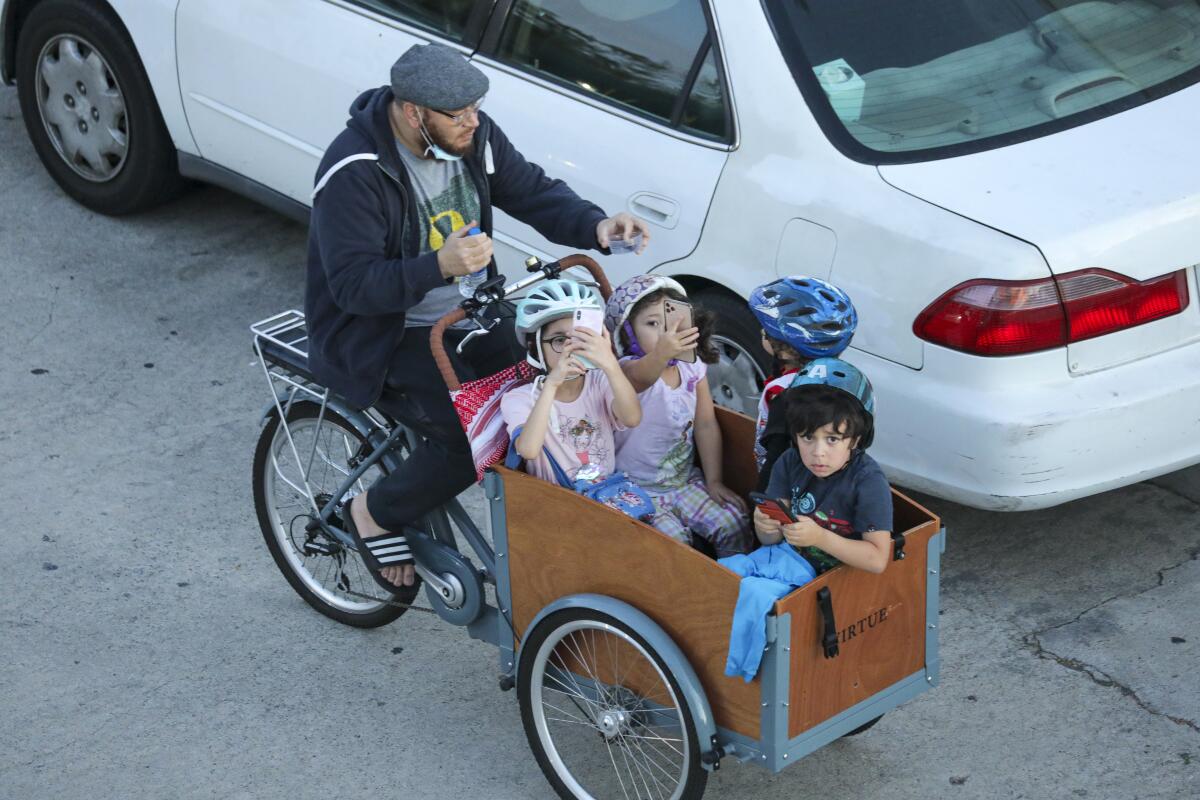
In 2015, Duke University called off its plan to sound the prayer call from the chapel’s 210-foot bell tower for the first time, in the face of anti-Islamic tirades on social media and concerns about security.
So this year, when mosques received permits to share the adhan through Ramadan, starting in Minnesota, some worried about what could happen.
“I’m very excited but ... deep inside I also have some concerns. Not because it’s not the right thing to do,” said Hussam Ayloush, executive director of the Los Angeles chapter of the Council on American-Islamic Relations. “But because we also still have people in our country who harbor prejudice towards Muslims or people who are not part of the majority.”
Last week, in Fontana, Ar-Rahman Islamic Center began broadcasting the adhan four times a day — omitting the earliest one around 4:30 a.m.
The only issue the center had, director Juma Darwish said, is that the prayer caller was too loud and actually broke the speaker outside — which the center is working to fix. The mosque has no end date on the broadcast.
“We’re just going to keep doing it until we feel any neighbor has discomfort with it,” Darwish said. “We’re not going to do it if a neighbor complains about it.”
Rauf Patel, director of King Fahad Mosque, and his wife, Anisa, were excited when they heard that the adhan was being publicly broadcast in Minnesota. Anisa convinced her husband to request a permit to do the same in Culver City.
In his letter to the city, Patel said broadcasting the adhan “would be a beacon of light in this trying time.” The mosque has been closed since March.
“During these difficult and unusual times of COVID-19, staying away from the mosque during our holy month has been challenging,” Patel wrote. “Being able to call to prayer out loud ... would not only lift all of our spirits, but also bring back [a] sense of our unity in our community and get us through our last few days of Ramadan.”
Soon after, the Police Department issued the permit. It would last until May 22, the day before the start of Eid al-Fitr, a celebration known as feast of the fast-breaking.
On the first day, May 14, Ahson Syed, the mosque’s religious director, stepped on overturned milk crates and up three steps that allowed him to peer over the roof at the people gathered below.
In Saudi Arabia, Syed was accustomed to hearing the call to prayer five times a day. In the U.S., he typically heard it only inside of mosques or community centers —- certainly not from the rooftops, broadcast across neighborhoods.
That evening, he was the first one to recite the adhan publicly, his voice ringing with emotion over the black loudspeaker. Half of the attendees that night were crying.
On the third night, Suzan Alrayes stood below with her 3- and 5-year-old sons, her husband and her parents. It had been a hard Ramadan, one in which she struggled to explain to her children the lurking, viral danger that prevented them from coming to the mosque.
That Saturday evening, there were plastic containers of dates and water bottles for attendees to take for the breaking of the fast.
The first time Alrayes heard the adhan from the roof of the mosque, she said, “it just gave me goose bumps.”
“I can’t even describe the feeling,” she said. “We’re not used to having the adhan in public in the United States.”
She just hoped, she said, that it wouldn’t disturb the non-Muslim community in any way.
“That would be my only concern,” Alrayes said.
Neighbors living around the mosque were surprised to hear the permit had been revoked, albeit briefly. Many of them said they couldn’t hear it, even though they live nearby.
The mosque, one resident, Liliana Cruz said, is “very much a part of the neighborhood.” She wondered about who would call to complain about the noise, calling them “jerks.”
“I don’t know who those people are,” Cruz said. “I don’t even want to know them.”
Another neighbor, who only gave his name as Eddie, said he wished neighbors had been given a heads-up about the call to prayer. He has stereo equipment, but said he could still hear the adhan from his home, which stands in view of the blue and white minaret.
“If you don’t have anything to avoid it, it can be a form of distress,” he said.
Debra Sugarman, who has lived in the city for 10 years, said she’s spent a lot of time in the Middle East and enjoys hearing the call to prayer. Sugarman, who lives a few blocks from the mosque, said she strained to hear the adhan the first few nights. She wished, she said, that it had been louder.
“It’s Ramadan,” Sugarman said. “They should be allowed to practice their religion.”
Times staff photographer Irfan Khan contributed to this report.
More to Read
Sign up for Essential California
The most important California stories and recommendations in your inbox every morning.
You may occasionally receive promotional content from the Los Angeles Times.

